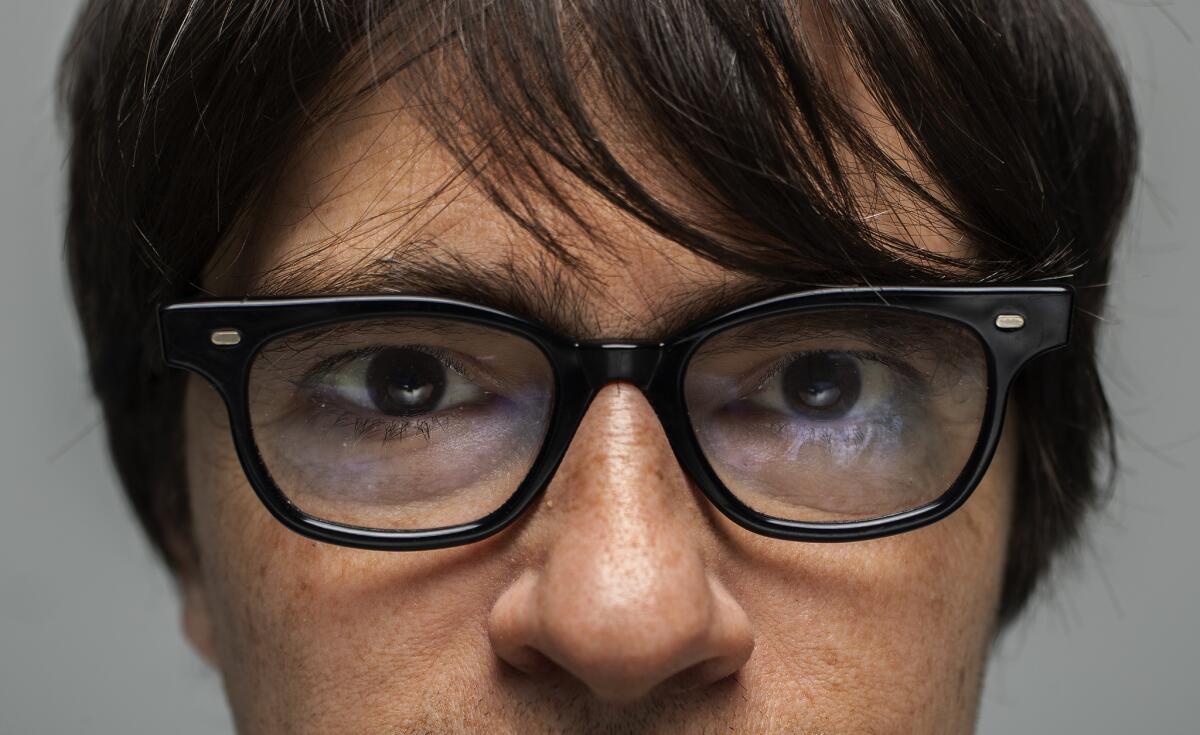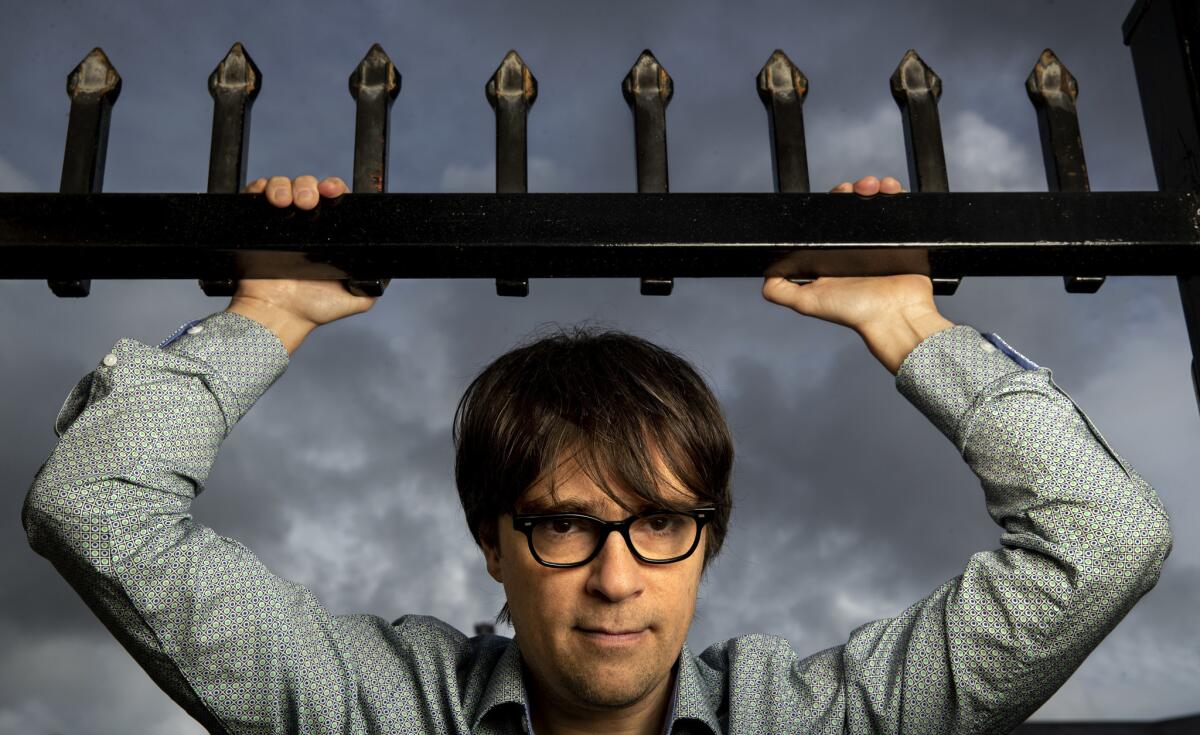Being Rivers Cuomo: Why Weezer’s frontman put his life into a spreadsheet

Rivers Cuomo opened the door to his home in Santa Monica and said he had something to show me.
Hurrying down a staircase, Weezer’s frontman led the way to a computer in his subterranean recording studio, the monitor aglow with lines and lines of code. This is his latest obsession, he said — the happy result of having completed CS50, Harvard University’s popular introductory computer-science course that’s available to anyone on the internet. (Cuomo, a real-world Harvard alum who spent a decade chipping away at a bachelor’s degree in English literature, said he took about three years to finish CS50 between obligations to Weezer and to his family.)
On his computer screen was a program he’d devised to feed information pertinent to the proudly geeky rock band’s upcoming tour — drive times, bus calls, names of hotels — into a continuously updating schedule.
He’s written other programs too, including one that refreshes a private Spotify playlist every day with tunes that might inspire his own songwriting. Cuomo, who wore a CS50 T-shirt, jeans and a pair of beat-up slippers, pulled out his phone and tilted it my way; punk oldies by Public Image Ltd. and X-Ray Spex sat amid a diverse assortment of tracks from Dua Lipa, Brad Paisley and the French DJ Gesaffelstein.
“It’s called ‘Eclectricity,’” he said of the playlist.
For many old-school Weezer fans — listeners like Leslie Jones’ character in a viral “Saturday Night Live” sketch who think the group effectively died after “Pinkerton” in 1996 — Cuomo’s dabbling in such far-flung sounds is something to bemoan.

“Weezer put out two perfect albums,” Jones says in the “SNL” skit, referring to “Pinkerton” and the self-titled 1994 debut known as the Blue Album. Then Cuomo was led astray, the thinking goes, by the stylistic and emotional experimentation of songs like the arch “Pork and Beans” and “Can’t Stop Partying,” which featured a rap verse by Lil Wayne.
“They’ve been trash since 2001, son!” Jones tells Matt Damon, who appears in the bit as a “ride or die” Weezer loyalist.
Yet the polarized reaction to Weezer’s music has hardly diminished Cuomo’s eagerness to complicate the fuzzy three-chord power pop that made him a star. Last month, as a surprise follow-up to its hit 2018 version of Toto’s “Africa,” the band released an all-covers disc called the Teal Album with renditions of Michael Jackson’s “Billie Jean” and “No Scrubs” by TLC.
On March 1 it will drop yet another self-titled set, this one known as the Black Album. Produced by TV on the Radio’s Dave Sitek, who’s also worked with Beyoncé and Jay-Z, the record has slick synth textures and low-slung hip-hop-style beats; “Living in L.A.” sounds like Bruno Mars doing the Police, while “California Snow” opens with a squealing digital fanfare that calls to mind Kanye West’s “Yeezus.”
Lyrically too, the songs on the Black Album — several of which Cuomo co-wrote with pros including Rami Yacoub and David Hodges — veer from the theme of unrequited love that defined Weezer’s early stuff. The singer, 48, said he used a cut-and-paste technique at times, as in “Zombie Bastards,” which he narrates from the point of view of a guy “just trying to live and get my kicks.”

“A lot of those lines have nothing to do with each other,” he said. “When I listen to it, I hear a story or a message that is suggested. But I can’t say that I had it when I sat down to write the words.”
He was also trying to put himself in Sitek’s head.
On recent albums — the Black Album is Weezer’s fifth since 2014 — “I’ve gotten into this mode of collaborating with the producer where I feel like I’m a portrait painter and the producer is my model,” he said. Cuomo would go to Sitek’s house, which he compared to a high-tech pot grow filled with “the craziest knickknacks and music gear,” and “just kind of inhabit his character as I was writing.” (For his part, Sitek told me he listened to Cuomo’s demos while tripping on psychedelics so as to imagine possibilities outside Weezer’s established identity.)
As an example of this role play, Cuomo pointed to the jaunty “Piece of Cake,” which opens, “Let’s do hard drugs / Fix our problems.”
“I would never say something like that — I’m the most straight-edge guy ever,” Cuomo said with a laugh. “But it’s, like, What would sound cool to Dave?”
And if the result seems at odds with the sensitive nerd from the Blue Album? Eh — Cuomo isn’t worried about Weezer’s internal consistency.
“Very often I’ll finish an album and want to do something totally opposite for the next one,” he said. On 2016’s White Album, “if you count up the number of times I said ‘girl,’ it was like hundreds of times. I got so sick of it that on the next album, ‘Pacific Daydream,’ I didn’t use it once.”
One reason Cuomo is willing to pursue these impulses is because each Weezer record feels like less of a big deal than it used to.
“There are so many ways to get music out now — and the expectations are so much lower — that you can commit fully to going in some random direction,” he said after we moved from the studio to a neatly decorated living room. Cuomo shares his house with his wife, Kyoko (whom he married in 2006), and his two children, and on a table were a trumpet and several music instruction books he said belonged to his daughter.

“In the old days, there was so much riding on an album,” he went on. “You spent two years making it, then two years promoting it. It had to be exactly right — to represent Weezer exactly as they should be represented.” He shrugged. “Now it’s, like: That’s a weird idea — let’s try that.”
The trumpet reminded Cuomo of those old days, when he spent a few weeks before the Blue Album’s release playing in a wind ensemble at Los Angeles Valley College.
“We’d recorded the album but it hadn’t come out yet,” he said. “And I had a few dollars left from our advance, so I went and took, like, six music classes at once.” One day he and a friend were walking back from campus to their apartment on Fulton Avenue when they learned that Nirvana’s Kurt Cobain had died.
“And this was the period after the ’94 earthquake in Northridge. I remember feeling aftershocks in wind ensemble. A very rough start to that year — then everything changed on May 10, when the album came out.”
Cuomo said this as he says most things: with the calm deliberation of a guy who grew up on an ashram in Connecticut and now meditates daily.
But it was surprising to me to recall that those three events happened in such quick succession. Perhaps due to my age, I told him — I was 16 that year — the timeline in my mind is nowhere near as neat as Cuomo’s.
“I actually have a horrible memory, but I do have this weird memory for timelines, especially pre-2007,” he said. “Because I’ve researched it so much and put it into a giant Excel spreadsheet.”
Wait, you’ve researched your own life?
Yeah.
Why?
For years I just did it for fun. I just have this strong sense of nostalgia and romance for my history and upbringing. I felt like it was the story of a legend, so I’d study it and talk to people and take notes. I don’t feel that way anymore, but I used to.
Do you still have all the notes?
Most everything I’ve thrown away or put in bins in storage. And I don’t plan to ever look at it again.
You were saying earlier that you’re the most straight-edge person ever.
When I started meditating in 2003, I finished my first 10-day course and came out very inspired. I wanted to go as far and as deep as I could, and with my teacher, to even apply for longer courses, you have to have been following the five precepts given by the Buddha for at least two years.
So: No killing — easy. I’m a lifelong vegetarian. I don’t kill anything other than the occasional insect by accident. No stealing — OK, I don’t steal. No lying, no exaggeration.
Seems trickier.
Especially for a songwriter. When am I being creative versus when am I lying? But I did my best with that. No sexual misconduct — and for my teacher, that meant no sexual activity of any kind unless you’re in a lifelong committed relationship. That’s how I ended up starting my three years of celibacy, which was very difficult and not recommended. And then no intoxicants. So from June of 2003, I haven’t had a drink or a drug of any kind.
And before that? Did you have the debauched rock-star experience during Weezer’s first decade?
That was my dream as a kid, although it was more about girls for me. But that didn’t come true on the Blue Album. As successful as that album was, it didn’t feel like we were in Mötley Crüe.
Well, it didn’t look like it either.
It was really disappointing. We’d actually made it! But we were these super-innocent, clean-cut guys on our album cover, and most of our fans were 10 years old. That led to “Pinkerton,” which was the big reveal: Actually, I’m a pig and a dog, as I say in the lyrics. That album cycle was a partying album cycle. But I think I actually have something called Gilbert’s syndrome, which is a genetic inability to process alcohol in the way other people do. So I get all the unpleasant effects of alcohol without the pleasant effects.
Even if you were living it up in the classic way, you strike me as the type of person who would’ve been very self-conscious about it.
There’s always part of my mind that’s kind of looking down at myself; it was very hard to just let go and feel like I was living this fun, spontaneous, carefree life of the rock star. That’s where I’d get a song like “Tired of Sex” [from “Pinkerton”].
Can you relate to that song now?
Totally. It was coming from such an honest and real place — such a Rivers-y place. I still feel like the same person; I’m just not in that predicament anymore.
Do you think people would use words like “honest” and “real” to describe the songs you’ve been writing lately?
I think the deep, dark truth is gonna be an ingredient in any recipe we put out. But it doesn’t dominate the recent recipes like it did “Pinkerton.”
If there’s a dark truth to the Teal Album, it might be that Weezer enjoyed the burst of attention its “Africa” cover received — and desperately wanted more.
Where the Black Album feels like a genuine product of Cuomo’s creative curiosity, the covers set (which also includes faithful renditions of ELO’s “Mr. Blue Sky” and Tears for Fears’ “Everybody Wants to Rule the World”) comes across as little more than a stunt. There’s something cynical about the way it seems to be provoking people like Jones’ purist from “SNL.”

Cuomo insisted that he was just trying to “find songs that would be fun for our fans to sing along to.” But as with “Africa,” which the band recorded in response to a jokey social-media campaign, Weezer plays the songs so straight that it’s hard to know what fresh meaning we’re supposed to derive from them.
“Hey, don’t look at me,” Cuomo said with a grin.
What do you get from them?
Well, I read the Wikipedia page for “You Can’t Hurry Love” by Phil Collins, which I loved when I was 12. I didn’t even know it was a cover [of the Supremes classic]. And on that Wikipedia page it says they had no interest in re-imagining the song. They just wanted to copy exactly every nuance of the production and performance. I thought that was really interesting.
The Phil Collins approach resonated with you.
As a student of music, maybe one of my motivations for making the Teal Album was to learn how the truly great songs work. I got all the a cappellas off YouTube and listened to every one of a hundred tracks of Michael Jackson’s voice, trying my best to replicate it. I mean, I can do a Weezer re-imagining of a song any day. You don’t have to put any thought into that.
So the exercise was worthwhile for you. What about the listener?
You don’t see any reason to listen to Weezer’s “Africa” over the Toto version?
I don’t.
It doesn’t rock a little more? I’ve heard people say, “I heard Toto’s ‘Africa,’ and it didn’t seem to have the rock thing.” So I’d say that’s a reason to listen to the Weezer version.
I guess rocking just doesn’t feel intrinsically valuable to me.
I think if you’re going to a show, rock is pretty great. I don’t think rock can be beaten live.
Many would disagree, of course. As a cultural force, rock is not particularly healthy at the moment.
Yet for all the criticism of its recent records, Weezer — which also includes guitarist Brian Bell, bassist Scott Shriner and drummer Patrick Wilson — remains an impressive draw on the road. Next month in New York it’s scheduled to play Madison Square Garden with the Pixies and TV on the Radio, and it’s among the few rock acts high on the bill for April’s Coachella festival.
“That feels like something to be proud of,” Cuomo said.

Weezer is also staying busy in the studio — busier, certainly, than the middling sales for “Pacific Daydream” would seem to invite.
Cuomo said the group is almost finished with another album, one he described as “piano-based, very eccentric, with strings already recorded at Abbey Road.” (Its working title is “OK Human,” after Radiohead’s “OK Computer,” though the singer identified his musical inspirations as George Gershwin and “Nilsson Sings Newman.”)
But that won’t necessarily be the one to come out first after the Black Album, Cuomo cautioned as he walked me to the door. He’s also working on a project called “Van Weezer,” about which he said, “You can probably figure out the concept from the title alone.”
Maybe because I had Harry Nilsson on the brain, I thought he was referring to Van Morrison.
“Wrong Van,” he said in a way that made it clear he meant Van Halen.
“But ‘Astral Weeks’ was actually a huge influence on ‘Pinkerton,’” he added before turning to go back downstairs.
Twitter: @mikaelwood
More to Read
The biggest entertainment stories
Get our big stories about Hollywood, film, television, music, arts, culture and more right in your inbox as soon as they publish.
You may occasionally receive promotional content from the Los Angeles Times.











